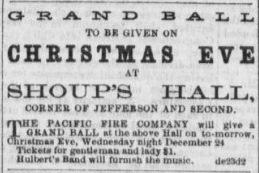A Grand Christmas Ball

When I think of the Christmases of years past, I think of The Nutcracker Prince, the 1990 animated movie set to Tchaikovsky’s score of the famous Nutcracker ballet. The movie, set in Germany in the 1850s, opens with a grand party where young Clara learns of the story of the nutcracker. I always loved the idea of being invited to a grand Christmas party like in the movie, complete with dancing, holiday drinks, and socializing. All throughout my childhood years, I imagined that this was how people celebrated Christmas before, during, and even after the Civil War, completely overlooking the fact that the movie was set it Germany. In some ways, my childhood naivety was right- there were grand balls and merry-making like in the movies, just not as extravagant as I once thought. The way the South celebrated Christmas changed, but Christmas remained a time for family and friends to gather.
For the South, the Christmas holidays from 1861-1864 were bleak. With a constant barrage of bad news from the front, families separated, and little money to purchase extravagances to celebrate the holiday, it’s no wonder that Christmas Day usually passed in a somber manner. Some families attempted to keep traditions alive, but even this sometimes backfired. Kate Stone in Louisiana commented on her 1861 Christmas and her family’s “customary eggnog before breakfast.”[i] Even in the early stages of the war, simple treats such as eggnog were a luxury. Kate lamented that the eggnog that year was “not a prize nog. It was made of borrowed whiskey with a strong flavor of turpentine…This is the first Christmas in our recollection that was not a time of fun and feasting.”[ii] Sallie Brock Putnam, of Richmond, Virginia, echoed the same sentiments concerning the holidays, but in a slightly more subdued manner. She wrote, “Never before had so sad a Christmas dawned upon us….We had neither the heart nor inclination to make the week merry with joyousness when such a sad calamity hovered over us.”[iii]

In the North, the Christmas holidays continued as usual, but with a little less bravado. Christmas still maintained the social musings and uplifting atmosphere as in the years prior. In many Northern newspapers, local businesses or esteemed citizens advertised Christmas Balls. One such, the Dayton Daily Empire, advertised a “Grand Ball to be given on Christmas Eve at Shoup’s Hall” arranged by the Pacific Fire Company.[iv] Tickets were advertised as “for gentleman and lady $1.”[v]

Similar advertisements appear in the Nebraska advertiser in December of 1861 ($1.00 per ticket), the East Saginaw courier in 1862 (50 cents per ticket), and the Washington standard in 1861 ($4.00 per ticket). [vi] The Washington standard advertised a ball in 1864, at Colonel Dowling’s New Hall- supper to be included, but did not declare the admission price.[vii] Another newspaper, the Boise News, recounted the events of a ball the “Messrs. Seeley & Brower” held Christmas Eve of 1863. The paper reported: “we hear it was the most decided success of anything of the sort that has ever taken place in [the] city. Nearly all the gaiety, beauty, fashion, chivalry, gallantry, dignity, and politeness of the place was represented. The only inconvenience spoken of was the crowded state of the hall.”[viii]
One known instance of attempted merry-making in the South occurred in Vicksburg, Mississippi. As the tale goes, Emma Balfour and her husband, Dr. William Balfour, held a ball at their home on Christmas Eve, 1862. Guests included many Confederate officers and their families, but most notably Brig. Gen. Martin Luther Smith, and Lt. Gen. Stephen D. Lee. The party was interrupted by a rain-soaked Confederate courier soon after midnight, who had received a telegram concerning the sighting of Union gunboats heading down the Mississippi River for Vicksburg. The courier, stopping at nothing to deliver the message, searched for General Smith among the party goers. Rumor has it that General Smith, upon hearing the news, yelled out, “This ball is at an end! The enemy is coming down river. All non-combatants must leave the city!” And so started the initial battle of the Vicksburg Campaign.
[i] Kate Stone, Brokenburn: The Journal of Kate Stone, ed. John Q. Anderson (Baton Rouge: Louisiana State University, 1955), 76.
[ii] Ibid, 76.
[iii] Sallie Brock Putnam, Richmond During the War: Four Years of Personal Observation (Lincoln: Bison Books, 1996), 86.
[iv] Dayton daily empire (Dayton, OH), 24 December 1862, Chronicling America: Historic American Newspapers, Library of Congress, http://chroniclingamerica.loc.gov/lccn/sn85026002/1862-12-24/ed-1/seq-1/
[v] Ibid.
[vi] Washington standard (Olympia, Washington territory) 21 December 1861, Chronicling America: Historic American Newspapers, Library of Congress http://chroniclingamerica.loc.gov/lccn/sn84022770/1861-12-21/ed-1/seq-3/
[vii] Washington standard, Olympia, Washington territory 21 December 1864 Chronicling America: Historic American Newspapers, Library of Congress http://chroniclingamerica.loc.gov/lccn/sn84038189/1864-12-21/ed-1/seq-2/
[viii] Boise News (Idaho City, ID) 26 December 1863, Chronicling America: Historic American Newspapers, Library of Congress, http://chroniclingamerica.loc.gov/lccn/sn89055016/1863-12-26/ed-1/seq-2/
Further Reading:
Boise News. (Idaho City, ID), 26 Dec. 1863. Chronicling America: Historic American Newspapers. Library of Congress. http://chroniclingamerica.loc.gov/lccn/sn89055016/1863-12-26/ed-1/seq-2/
Dayton daily empire. (Dayton, OH), 24 Dec. 1862. Chronicling America: Historic American Newspapers. Library of Congress. http://chroniclingamerica.loc.gov/lccn/sn85026002/1862-12-24/ed-1/seq-1/
Putnam, Sallie Brock. Richmond During the War: Four Years of Personal Observation. Lincoln: Bison Books, 1996.
Stone, Kate. Brokenburn: The Journal of Kate Stone, Edited by John Q. Anderson. Baton Rouge: Louisiana State University, 1955.
Washington standard. (Olympia, Washington Territory), 21 Dec. 1861. Chronicling America: Historic American Newspapers. Library of Congress. http://chroniclingamerica.loc.gov/lccn/sn84022770/1861-12-21/ed-1/seq-3/
Washington standard. (Olympia, Washington Territory), 21 Dec. 1864. Chronicling America: Historic American Newspapers. Library of Congress. http://chroniclingamerica.loc.gov/lccn/sn84038189/1864-12-21/ed-1/seq-2/